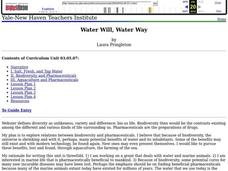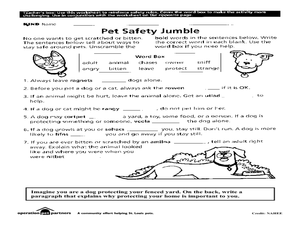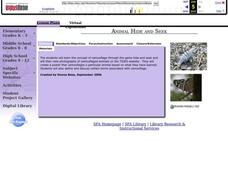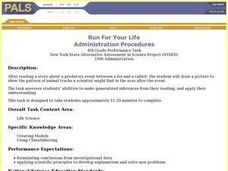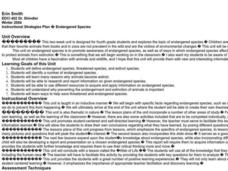Curated OER
Water Will, Water Way
Students test tap water for hardness and mineral content. In this environmental science lesson plan, students identify the different stages of the water cycle. They classify plant and animals according to the rules of taxonomy.
Curated OER
When Dinosaurs Ruled
Students research about plants and animals during Triassic period. In this earth science lesson, students draw pictures of their chosen plants and plants for the bulletin board. They present their project in class.
Curated OER
Are You an Animal Safety Sleuth
In this animal safety lesson, students brain-storm ways to be kind and safe with animals throughout the year. Students create a Kind Calendar for Animals in art class and distribute copies to other classes in the school. grocery stores,...
Curated OER
TIDES
Second graders are taught the concept of camouflage through the game hide and seek. They view photographs of camouflaged animals on the TIDES website. Students create a poster that camouflages a particular animal based on what they have...
Curated OER
Butterfly Lifecycles
What a great way to present this topic! While a little difficult to follow, this lesson plan provides great ideas for a second grade lesson plan involving butterfly lifecycles. Learners make drawings of butterflies, discuss life cycles,...
Curated OER
Reading 1: Rescue Ink
In this present and past progressive reading comprehension worksheet, students read a 5-paragraph reading selection and then respond to 10 true or false questions.
Curated OER
Leeches: Who Knew?
The answer key to a page of questions about a children's reading on leeches, this resource is missing its companion text. However, the questions could be used with any age appropriate reading about leeches. Readers make predictions,...
Curated OER
Where Are the Dinosaurs?
Students create a dinosaur egg with balloons and newspaper. In this earth science lesson plan, students explore the extinction of dinosaurs. Students view a web clip and relate it to the extinction of animals they have never seen.
Curated OER
Animal Habitats
Students study the word habitat and its meaning. They also identify that in order for something to be classified as a habitat there needs to be the proper shelter, food, water, and space.
Curated OER
Create a Habitat for an Animal
In this marine life learning exercise, students label the ocean animal and each part of its habitat. Students then draw one of the habitats including the animals and plants that live there.
Curated OER
Animal Electronic I.D.
Students discover ways to keep the animals in our environment safe by examining electronic I.D. tags. In this animal safety instructional activity, students participate in a role-playing activity in which they are monitored by an...
Curated OER
Run For Your Life
Students draw a picture of animal tracks a scientist might find after they read a story about a fox chasing a rabbit. They make up a key to represent the foxes' tracks and the rabbit's tracks.
Curated OER
Education of the Heart
Sixth graders compare and discuss a given set of quotes by Pericles and Cesar Chavez and how they relate to a peaceful society. They respond to a variety of quotes and discuss the animal issue of animal tested cosmetics then discuss...
K12 Reader
Habitat Destruction
What happens when an animal becomes endangered or extinct? Explore the ways that human influence throughout the environment has threatened the existence of other species with a reading passage. After reading the paragraphs, kids answer...
Roy Rosenzweig Center for History and New Media
American Indians and their Environment
People could take a page in ingenuity and survival from the Powhatans. Deer skins became clothes, and the members of the Native American group farmed the rich Virginia soil and hunted in its forests for food. Using images of artifacts...
K12 Reader
Hide and Seek
After examining a brief article about survival adaptations, readers identify the main idea of the passage and list two supporting details.
NOAA
Individual Species in the Deep Sea
A tube worm's outer covering is made of chitin, the same material that makes up the shells of lobsters and crabs. Scholars create tube worms and analyze and discuss the longevity of organisms living near cold seeps. They then discuss and...
Howard Hughes Medical Institute
Virus Explorer
Most pupils know about the flu, HIV, and other viruses, but they don't know what each actually looks like. This interactive shows their relative size, structure, and allows for comparisons. It stresses the similarities and differences...
Curated OER
African Savanna
First graders are introduced to the ecosystems of savannas throughout the world. Using new vocabulary, they identify and describe the characteristics of a savanna and the animals that live there. They also describe the Earth's physical...
Curated OER
Endangered Species
Fourth graders investigate endangered species to discover reasons for the extinction. Resources are examined to determine preventive measures for the endangerment. The unit contains four lessons.
Curated OER
Grand Canyon History Lesson
Students explore the history of the Grand Canyon. In this Grand Canyon lesson, students read "Grand Canyon National Park" by David Peterson and respond to questions regarding the piece. Students also create their own fossil models that...
Curated OER
Species Charades
Students are introduced to a unit on endangered species. They study the diversity of endangered animals through a game of charades. After the game, students will discuss the animals that were acted out and why some of them are endangered.
Curated OER
Animal Adaptation
Young scholars begin the activity by observing animals in their natural habitat. Using the internet, they research the types of adaptations they have gone through to be able to live comfortably in their environment. They observe what...
Curated OER
Read a Bar Graph
In this bar graph worksheet, students use a bar graph of favorite zoo animals to solve 6 simple word problems. Houghton Mifflin text is referenced.


